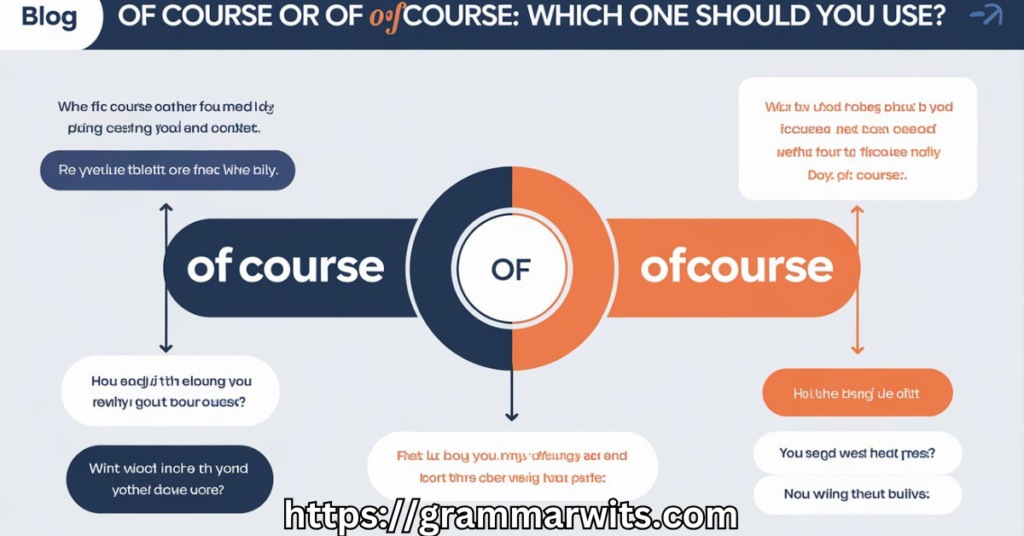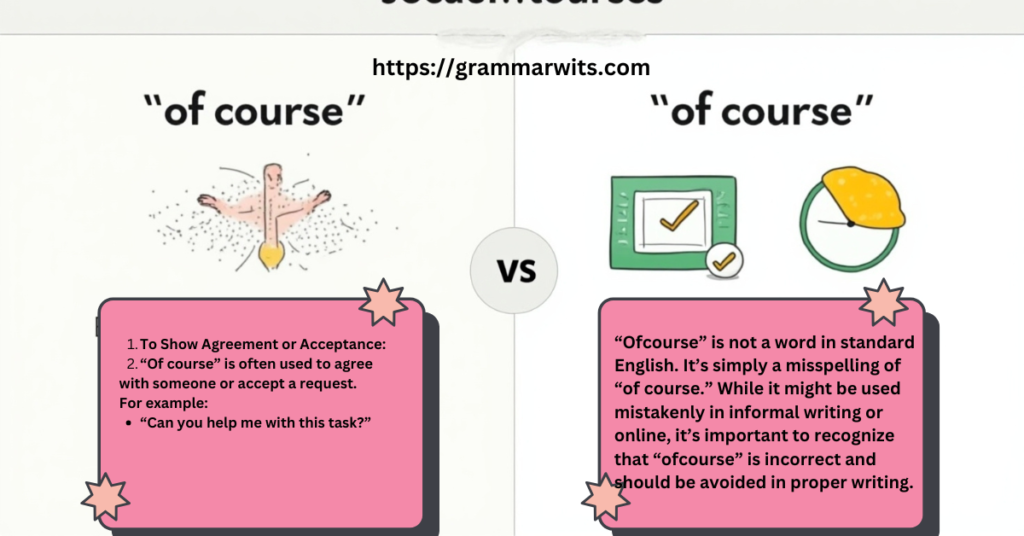Introduction
The phrase “of course or ofcourse which one is correct” refers to the distinction between the correct English phrase “of course” and the incorrect spelling “ofcourse.” “Of course” is a widely used expression that conveys certainty, agreement, or something that is naturally expected. However, many mistakenly write it as “ofcourse,” assuming it to be a single word. Understanding the difference between the two is essential for clear and professional communication.
Imagine writing an important email, a business report, or even a social media post, only to have your credibility questioned because of a simple spelling mistake. A minor error like “ofcourse” instead of “of course” can make your writing look unpolished and unprofessional. Spelling and grammar matter, especially in formal communication, and mastering these details can set you apart as a confident and effective communicator.
The confusion between “of course” and “ofcourse” mainly arises because of the way the phrase is spoken. Since it is often pronounced quickly, many assume it to be a single word. However, in standard English, “of course” should always be written as two separate words. Using the correct form enhances clarity, ensures grammatical accuracy, and strengthens your writing. Whether drafting an email or crafting an essay, knowing this distinction can help you avoid a common mistake.
Why Is There Confusion?
The confusion between “of course” and “ofcourse” happens for several reasons:
- Fast Speech Patterns: When spoken quickly, “of course” can sound like one word, leading to the incorrect spelling “ofcourse.”
- Digital Communication Habits: People often shorten words and phrases in texting and informal online conversations, reinforcing the mistake.
- Association with Similar Words: Words like “off course” exist as a single unit, making some assume “of course” should also be written together.
- Lack of Grammar Awareness: Many non-native English speakers, and even native speakers, mistakenly believe “ofcourse” is an alternative spelling.
Understanding why this mistake occurs is the first step in avoiding it.
⚡ Quick Summary: Of Course or Ofcourse – Which One Is Correct?
The phrase "of course" is the correct spelling, while "ofcourse" is a common mistake. "Of course" is used to express certainty, agreement, or politeness in both spoken and written English. Many mistakenly combine the words due to misinterpretation, but dictionaries and grammar rules confirm that the correct form is always two words. In formal writing, synonyms like "certainly" or "naturally" can be used. Understanding the difference helps maintain clarity and professionalism in communication.What Do “Of Course” and “Ofcourse” Mean?
“Of Course” – The Correct Spelling & Meaning
The phrase “of course” is used to express certainty, agreement, or something that is expected. Here are its primary meanings:
- Agreement: Used to affirm something positively.
- Example: “Of course, I’ll help you with your assignment.”
- Obviousness: Used when something is clear or naturally understood.
- Example: “Water is, of course, necessary for survival.”
- Reassurance: Used to confirm something kindly.
- Example: “You are always welcome here, of course!”
- Sarcasm: Used when making a point with irony.
- Example: “Oh, of course, I just love doing extra work.”
“Ofcourse” – Is It a Real Word?
No, “ofcourse” is not a real word. It is a spelling mistake and is not found in any official English dictionary. Writing “ofcourse” instead of “of course” in formal settings—such as business emails, job applications, or academic essays—can negatively impact how others perceive your writing skills.
Synonyms and Alternative Phrases for “Of Course”
If you want to avoid repetition, consider these synonyms for “of course” that work in different contexts:
| Alternative Phrase | Meaning | Example Sentence |
|---|---|---|
| Absolutely | Expresses total agreement | “Absolutely, I’ll be there!” |
| Definitely | Strong confirmation | “I’ll definitely send you the files.” |
| Naturally | Something expected | “Naturally, she was excited about the promotion.” |
| Without a doubt | No hesitation | “Without a doubt, this is the best pizza in town.” |
| Sure | Casual agreement | “Sure, I’ll join you for lunch.” |
Off Course vs. Offcourse – What’s the Difference?

The phrase “off course” is correct and means something is not on the intended path. It is commonly used in navigation, sports, and figurative speech. For example:
- The ship went off course due to the storm.
- His career plans went off course after the sudden job loss.
On the other hand, “offcourse” is incorrect and does not exist as a proper English word. If you see it written this way, it is likely a typo or misunderstanding.
Key Difference
| Phrase | Correct? | Meaning |
|---|---|---|
| Of course | ✅ Yes | Used to express certainty or agreement |
| Ofcourse | ❌ No | Incorrect spelling of “of course” |
| Off course | ✅ Yes | Means “not on the intended path” |
| Offcourse | ❌ No | Incorrect spelling of “off course” |
Always separate “off course” into two words to ensure proper grammar and clarity.
When and How to Use “Of Course” Correctly

“Of course” is a widely used phrase in English that signifies certainty, agreement, or affirmation. It’s a flexible expression that can be used in various contexts, from casual conversations to more formal settings. However, to use it correctly, it’s essential to understand when and how to incorporate it into your speech or writing.
1. Expressing Agreement or Affirmation
“Of course” is often used to agree with something or confirm a statement. It implies that what is being discussed is obvious or self-evident. It’s a great way to reinforce your agreement, making conversations smoother and more natural.
Examples:
- “Can you help me with this task?”
“Of course! I’d be happy to help.” - “Is it okay to leave early today?”
“Of course, you can leave whenever you want.”
In these examples, “of course” shows that the speaker is completely okay with the request and there is no doubt about it.
2. Offering Reassurance
In some cases, “of course” can be used to reassure someone. It can help ease their concerns or doubts, offering a sense of certainty and confidence in your response. This usage is particularly common in customer service, casual chats, or any situation where reassurance is needed.
Examples:
- “Are you sure everything will be okay?”
“Of course, everything will be fine.” - “Will the report be ready by tomorrow?”
“Of course, I’ll have it done by then.”
The phrase here works as a promise or a reassurance, indicating that the situation is under control.
3. Polite Response in Social Situations
“Of course” is also used in polite responses to questions or requests. This usage conveys respect for the other person’s needs or wishes. It’s a good way to show willingness and positive engagement.
Examples:
- “Would you mind passing me the salt?”
“Of course, here you go.” - “Can I borrow your car for the day?”
“Of course, I don’t mind at all.”
In this context, “of course” serves to convey kindness and politeness, without the need for elaboration.
4. Giving an Explanation or Clarification
“Of course” can be used to introduce an explanation or clarification, especially when you believe the information being shared is well-known or common knowledge.
Examples:
- “Of course, the project deadline is next Friday, so we need to finish everything by then.”
- “Of course, you can’t park here; it’s a no-parking zone.”
In these cases, “of course” functions as a way to introduce a fact that you assume the listener should already know or should have expected.
5. To Emphasize the Obvious
When you use “of course” in a sentence, you’re often emphasizing that something is obvious or self-evident. This usage can come across as assertive, as you’re stressing the certainty or simplicity of the situation.
Examples:
- “Of course, I know how to use the software!”
- “Of course, we can meet tomorrow afternoon. That’s perfect.”
Here, “of course” emphasizes that there should be no doubt about the truth of the statement.
Common Mistakes to Avoid
While “of course” is a versatile phrase, it’s easy to misuse if you’re not careful. Here are a few common mistakes to avoid:

- Overuse of “of course”: While it’s helpful for emphasizing agreement, overusing it can sound insincere or repetitive. It’s best to vary your responses with other expressions when possible.
- Using “of course” in the wrong tone: In some contexts, “of course” can sound dismissive or sarcastic. For instance, if someone asks a very obvious question, responding with “Of course!” might come across as rude if not said with the right tone.
- Example of wrong tone:
- Person 1: “Is water wet?”
- Person 2: “Of course, duh!” (This could sound rude or condescending depending on how it’s said.)
- Example of wrong tone:
To prevent this, it’s important to pay attention to your tone, especially in professional or sensitive situations.
Examples of “Of Course” in Sentences
Here are some real-world examples:
- Polite response: “Could you send me the files?” – “Of course!”
- Common knowledge: “The Earth is, of course, round.”
- Sarcasm: “Oh, of course, I love waiting in long lines.”
- Formal tone: “We will, of course, notify you of any updates.”
- Friendly reassurance: “You can always count on me, of course!”
Origins and History of “Of Course”
The phrase “of course” has an interesting history:
- 16th Century Origin: The word “course” comes from the Latin cursus, meaning “a path or flow.”
- Meaning Shift Over Time: Originally, “of course” meant “as a natural consequence.” Later, it became an expression of certainty.
- Usage in Literature: Writers like Shakespeare and Jane Austen frequently used “of course” in their works.
Common Mistakes and How to Avoid Them
Here’s a quick reference table to help you avoid errors:
| Mistake | Why It’s Wrong | Correct Usage |
|---|---|---|
| “Ofcourse I agree.” | Incorrect spelling | “Of course, I agree.” |
| “Off course, I’ll help.” | “Off course” means going off path | “Of course, I’ll help.” |
| “Of course I can’t help.” | Sounds dismissive | “Unfortunately, I can’t help.” |
Quick Memory Trick

Remember that “of course” is two words because “course” is a noun. If you can replace “course” with “path” and the sentence still makes sense, you’re using it correctly.
❌ “Ofcourse I will attend.” (incorrect)
✅ “Of course I will attend.” (correct)
FAQs on “Of Course or Ofcourse Which One Is Correct”
1. Is “ofcourse” a correct spelling?
No, “ofcourse” is incorrect. The correct spelling is “of course” as two separate words.
2. Why do people mistakenly write “ofcourse” as one word?
Many assume it follows the pattern of similar words, but “of” and “course” remain separate in standard English.
3. Can I use “of course” in formal writing?
Yes, but use it carefully. In formal writing, alternatives like “certainly” or “naturally” may work better.
4. Does “of course” have different meanings?
Yes, it can express agreement, obviousness, or politeness, depending on the context.
5. Is “ofcourse” accepted in any version of English?
No, no major dictionary recognizes “ofcourse” as a valid word in any English dialect.
Conclusion
Understanding of course or ofcourse which one is correct helps you avoid common spelling mistakes. “Of course” is the right phrase, widely accepted in English. It expresses certainty, agreement, or politeness in conversations and writing. On the other hand, “ofcourse” is a misspelling and not recognized in standard English. Using the correct form improves your grammar, clarity, and professionalism in communication.
If you’re unsure, remember that of course or ofcourse which one is correct has a simple answer—always use “of course.” Whether you’re writing emails, essays, or casual messages, using proper spelling makes a big difference. English has many tricky phrases, but learning them ensures clear and confident communication. Keep practicing, and soon, these grammar rules will come naturally!

Alizy Smith is a passionate language enthusiast and the admin of Grammar Wits. With a love for wordplay, grammar quirks, and witty expressions, she’s dedicated to making language learning fun and accessible. From grammar tips to pun-filled laughs, Alizy ensures every piece of content entertains while educating — turning tricky rules into easy, enjoyable reads.
